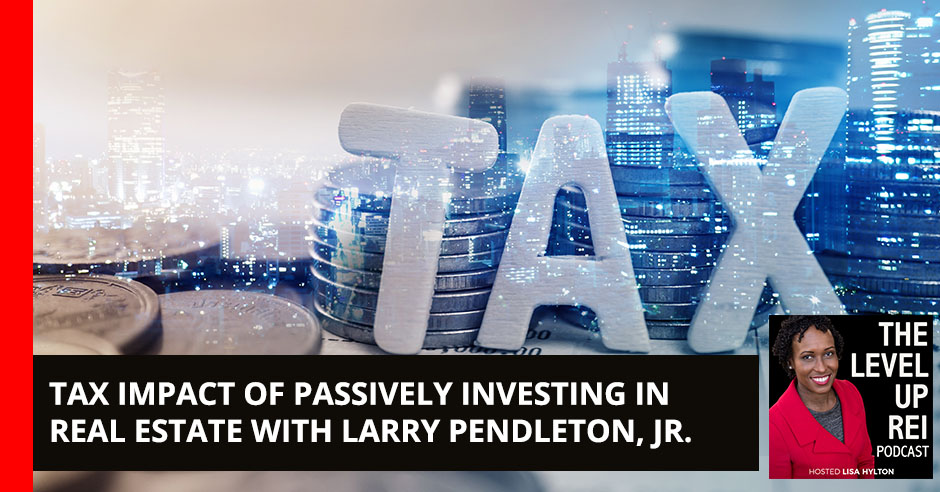
Owning real estate can provide steady passive income, but what impact can taxation have on your passive income? Lisa Hylton is joined by Larry Pendleton, Jr. as they talk about the effects taxes can have on real estate income, whether it’s passive income or capital gains. Larry shares his insights on what you can do to lessen the sting of taxes and discuss property depreciation and offsetting taxes on your passive real estate income. Learn techniques you can add to your toolbelt to succeed in the real estate business with this episode.
—
Watch the episode here
Listen to the podcast here
Tax Impact Of Passively Investing In Real Estate With Larry Pendleton, Jr.
In this episode, we are talking about the tax impact of passively investing in real estate. To help with this topic I have a special guest, Larry Pendleton, Jr. He is a CPA with over eight years of experience in tax consulting and preparation, accounting and financial statement auditing. He brings over five years of real estate experience as a multifamily investor involved in syndications, joint ventures, asset management, tax strategies, investor relations and underwriting. Larry is the Cofounder and Senior Partner at PC Financial Services, LLC. Being real estate investors themselves, Larry and his partner, Terreon Conyers, add value to other professionals who are in real estate by implementing tips and strategies to help maximize their clients’ tax benefits.
Larry also holds key finance and accounting positions for several real estate investment firms, one being RIZE Equity Group Holdings. Not only does he oversee the finance and accounting for these organizations, he also adds value by implementing some of the tax strategies that he recommends to his clients in order to maximize their investors’ returns. Most importantly, Larry is married to his wife, Whitney. He’s a proud father of two handsome sons, Larry III and Wesley. Welcome to the show, Larry. I’m happy to have you.

Passive Investing: Part of what’s going to offset the gain on the sale of the syndication or any real property itself is that you’ll have losses that’ve been built up over the years and you’ve been unable to use to offset a capital gain.
It’s nice to meet you, Lisa. I’m happy to be on. Thank you so much for the opportunity.
It’s always great to have a fellow CPA on the show. For all the CPAs reading, it’s a homecoming. I want to kick things off. My show is broken into three parts. One is we get into the background. In the second part, we get into the meat of the episode itself and then we close things out with my level-up questions. To get started, can you share with us what part of the US do you and your family live in?
We live in Southeastern Virginia. It’s Virginia Beach, Norfolk area for those who are familiar with the area.
What do you like to do for fun?
A lot of nothing if possible. It’s very simple like to get together with family and friends and get the kids together when possible. COVID put a damper on a lot of that but sit back, relax and enjoy our time together.
Has there been a challenge or something that has happened to you in your life that as a result of that thing happening to you, it has brought you a gift, unlocked or opened up for you a different perspective that you didn’t see before?
Working the whole nine to five for four years for somebody else is not the way to really feel fulfilled in life. Share on XI think a lot of your audience can probably relate from reading the Rich Dad Poor Dad book and realize that the life that you set up and thought was successful isn’t the way to go. You’re talking to someone who did grad school and got a CPA, I was like, “Being successful in the corporate world, I was like, ‘I’ve always felt like something was missing.'” That book and then the following books of Dad and others, I was like, “This is what it is. This whole 9:00 to 5:00 working for four years for somebody else, that’s not the way to do it to feel fulfilled in life from that standpoint.” That changed my perspective on a lot of things while I’m moving in the direction that I’m moving now.
In your bio, we touched on it in terms of your journey. Could you share with my audience your journey in terms of how you got started? I think you started out in public accounting.
I’ve always been interested in numbers growing up. I always knew how money and cashflow worked. I didn’t know what accounting was growing up but seeing how much my dad worked and how much he had to deal with taxes, pay bills and keep track of all that. I didn’t get my first indication of what that is from an accounting perspective until high school. We had an accounting class with a teacher I had a crush on. That was the reason why I took the class. It didn’t work out but the lessons in the class stuck with me from there. I was able to take that mindset of, “You’ll always have a job as an accountant.”
I went to a small college locally around here and it was the same thing. You graduate. I got my job in public accounting and worked my way up in the different levels there for eight years. I’ll say also something was missing. I wasn’t adding value. Even though I was helping people with taxes and audits, I stepped out to work for some public international companies and helped out in their internal audit department. PC Financial was created during my time of working in the corporate world because of the opportunity to help people to educate on taxes and put them in better tax positions from there. That’s my journey from the accounting side of things.
We touched on in your bio that you help a lot of real estate professionals in terms of getting their taxes done and managing their taxes from a tax planning perspective. Do you also help other people as well?
Yes. You’ve probably seen before, most accountants who step out and do their own tax business are generalists. They’re helping everybody and not specializing in anything. I’ve been able to help with multiple business owners before I started to narrow my focus down to just real estate and finding more and more tax strategies to help people there. I started to come and learn that you can have a separate business outside of real estate and still be involved in real estate for the tax savings.
Can you talk about the importance of when looking for a tax professional, finding one that has experience in the industry that you’re in like finding real estate CPAs?
You have to look at your tax professional. They can be an enrolled agent or a CPA. They don’t have to be one of those things if that’s what they’re specialized in. Those are tests that they pass to get the three letters behind their name. To someone who has specialized in it whether they are not certified as an accountant or an enrolled agent, you want to know how involved they are in the industry. They want to know the different nooks and crannies to put people in better situations instead of someone just scratching the surface or you are having to come or explain to them.
What deductions and things need to be happening?

Passive Investing: Passive losses are going to offset passive gains of funding from the properties.
You can go and explain to them what you’re trying to do. From there, they can put a particular tax strategy and plan and clarify what benefits may or may not work. It’s also looking at your tax professionals similar to how you look at your doctors. You got doctors who deal with your feet and you got doctors who deal with your teeth. If you have a foot problem, you’re not going to go to a dentist. It’s how the Tax Code is set up where it’s too convoluted. There are too many twists and turns. It’s similar to the human body where you can just have one person specialize in every aspect of it and provide solid advice. If they are, they are probably part of a bigger firm where they are referring to other people from who they can get those answers from.
Jumping into the meat of this episode, I want to talk about the tax impact of passively investing in real estate. Is there an impact or not? Let’s start there.
There’s always an impact because there’s a premise of you being able to make more money that potentially may not be taxed or not have to be taxed as heavily there because passively investing in rental real estate is considered a passive activity. It’s not subject to self-employment taxes like those who have active businesses. They’re not hit with the additional 15.3% in the self-employment tax there. You also have the opportunity of, you make X amount of money. You go ahead and deduct out all your operating expenses. I know a lot of people are using the 50% rule for that but then also factoring in other real estate-specific deductions that will allow people to net their net operating income down to zero or a loss for tax purposes.
Touching back on that, there are the real estate professionals and then you have everyone else who are not real estate professionals. You have people who are working a W-2 and you have business owners. I would like to leave real estate professionals to the end because the truth is not a lot of people qualify to be real estate professionals. That’s the truth unless they’re just not. This show is geared to a lot of entrepreneurs and business owners. I want to be able to provide for them. One of the questions that I get a lot is, “As well as people who are working a W-2 job, can I take the losses that I get on my K-1 and offset it against my active income that’s coming off of my business or W-2?” What is the answer to that?
There's always going to be another deal that you could potentially get into. Share on XWe all know what the answer is, “It depends.” That’s always the answer. You always say you won’t put a rough stance to the back because most are probably not going to qualify for that. Even if they can, especially if you’re a business owner, can you adjust your hours where you’re working more in your real estate portfolio than with your business? It depends on that part. Also, if your income is less than $100,000, you’re able to claim up to $25,000 of passive losses without being a real estate professional. For every dollar above $100,000, that benefit phases down $2. By the time you get to $550,000, then you’re completely phased out. That’s when trying to get a REP status comes into play there. There are opportunities to claim some of those losses depending on how much income that you are pulling from your business.
I did not know that. That’s why it depends. As someone who is a W-2 employee, I believe that it would be challenging for them to decrease. If they’re showing $100,000 in income, they would need to be creating maybe some kind of business in addition to working their W-2 job that is incurring a loss significant enough to bring down their adjusted gross income to be within the limits to take on some of those passive losses. Is that accurate or not?
That’s a good explanation of it as well as, “Do they have a solo 401(k) or something that they can invest into that to create a loss to help drive down their total income?” Because a lot of business owners typically have a lot of write-offs in general within their business that’s reasonable.
Before we go into the business, what I want to identify is that when you’re working at the W-2 side, I think there isn’t a lot of room to bring in expenses that can help lower your tax liability.
If you’re single, then it’s difficult. If you’re married, you do have a bit of an opportunity depending on what your spouse is doing like, “Is your spouse working? Is your spouse running your business? Is your spouse not working?” Depending on how active he or she is with the rental portfolio, that individual could qualify for a REP status. It gets difficult once you start getting to the high W-2 income earners, especially those who are single. I was talking to somebody about it where you almost had to take more of a Warren Buffett approach of like, “You’re investing into deals. Even though you may not be able to claim the losses, you’re able to make more income that you’re not taxed on.” You’re looking at it from the income side of it, the benefit, not the expense side of it.
You don’t have the ability to decrease your tax liability. It’s that you’re able to make more money but not increase your taxes as a result. Pivoting to the business owners and entrepreneurs, they now have a couple of things available to them. Number one, because they are running a business, they have those business expenses that they could strategically use to help as they’re working with you like someone who is very deeply knowledgeable about the tax code. Through the year, they can see, “This is how my income is going. This is how my expenses are going.” If they’re anticipating to do a deal that is going to sell, for instance, they’re in a syndication deal that they invested in two years ago and now it’s going to sell here in 2021, that money is going to come back. What are some of the things that they could do to mitigate the amount of taxes that they potentially could pay?
That’s a great question and scenario because a lot of people try to, “I’m in syndication. It’s about the sale. Can I 1031 out into this?” 1031 for your audience is the light kind of exchange. It’s your role in the gains from the sale of one investment into one long-term rental investment into another investment or mainly the light kind of exchange of the property. It’s possible but it’s messy because you can’t do it. You have to do it through a tenancy in common or what people typically break down to 10%. You, the individual, in order for 1031 to work, the entity that’s selling the property has to be the entity that’s buying the new property.
If you’re breaking away from your syndication, you’re not going to be able to do it. Plus, there are time constraints like with the identified property in 45 days and closing on the property in 180 days. My days may be off because I don’t push for 1031 too much. There’s another way to do it that’s a little more flexible is that if you know that the syndication is going to sell. Let’s hypothetically say they’re going to sell by February 2022. You get those gains that are sitting in your back pocket. You know that the 2022 tax season is going to come up in ten months at that point. What you end up doing is finding another syndication to invest into.
If that syndication is aggressive of how they’re going to get into cost segregation, that’s the thing that’s going to drive it down to a tax loss. Those losses if you invest into it before the end of that calendar year, so before the end of 2022, and then you can go ahead and offset the losses from that new syndication. If you do so on your own property yourself, now it can offset the gains from that sale of that old syndication from earlier that year. In a roundabout way, you end up creating your own 1031 without that small window. You just have to sell and buy there.

Passive Investing: If you’re a business owner, basically everything you potentially touch is considered a business deduction.
That brings up a couple of things for me. We have the cost segregation, which we need to touch on. I also want to touch on depreciation recapture and passive losses. The first thing that also comes to mind going back to that same example is someone is in syndication. It sells in February of 2022 and then now they have this money. Maybe they’re in 3 or 4 other syndications that have passive losses that are not matured. Can you use passive losses that were suspended because you are a “business owner” or a W-2 person and you couldn’t use those passive losses because you didn’t meet the criteria? Could you use some of those passive losses against the gain of that sale or not?
For those high-income earners who are unable to use those losses in those years, those just don’t go away. They are suspended for future years because technically, passive losses can only offset passive gains or passive income itself. As you’re in syndication, you can’t use those losses. They accumulate year after year. Part of what’s going to offset the gain on the sale of the syndication or any real property itself is that you’ll have losses that have been built up over the years that you’ve been unable to use to offset that capital gain.
One other item on passive losses. Can passive losses only offset passive gains from real estate? Could they offset passive gains from businesses?
It would have to be passive. For most people, unless they’re set up in a way where they’re not materially participating in their business, it’s not passive real estate versus passive business. It’s passive losses. Whatever is involved, it’s going to offset passive gains off from the properties. Many people try and make their passive losses not passive so it offsets more active income. If you have a lot of passive gains, then you’re going to increase your wage and maximize those losses that have been built up.
Can people use passive losses that are coming off of these real estate syndications to offset gains from their stock and bond portfolio?
No, because the stock and bond portfolio, even though it doesn’t appear to be passive, it’s not considering the budget there. The gains and losses from stock markets are more on the active side.
That then brings me to depreciation and cost segregation. What are cost segregation studies? How has that connected to depreciation?
You don't really only need just one property to be a real estate professional. Share on XIt’s best to start with what depreciation is because, technically, cost segregation is steroids for depreciation. You are a rental investor. You are partnering with the government to house the masses. You are providing a service to the masses and the government. They want also to incentivize more investors to do so. In order to incentivize that, they offer this thing called depreciation. The premise around that is that the building that you acquire or your syndication acquired is an income-producing asset. It’s not an expense, even though we all think it should be right off the building. It’s an asset that’s generating income for you.
To incentivize more investors to get involved on the rental side and provide more housing for the masses, it will allow you to recoup the cost of the building over a span of a number of years. It’s 27.5 years for residential properties. That’s the premise of what depreciation is. The cost of the building is divided by 27.5 years. It’s a paper loss per se because it’s added there. There are 5-year, 7-year and 15-year properties as well that can also depreciate. It’s all a case-by-case scenario of what you’re purchasing and the cost. That’s what depreciation is. What cost segregation is, now that we know what depreciation is, when someone buys a $1 million building, those $1 million are all the different components of that building that makes up that sales price.
A lot of times, people just take that $1 million, put it into the depreciation schedule and divide it over by 27.5 years. That’s the incorrect way of doing it because there are 5-year, 7-year and 15-year properties in that sales price. You got other properties that depreciate at a more accelerated rate than 27.5 years and you want to tap into that. The cost segregation comes in. You bring in engineers. If you’ve got some smaller properties or desktop offices as well where you’re taking that building and then now the engineer is breaking everything out into individual. You start getting the cost of all those personal property items leased like landholder improvements and whatnot and then providing value to it.
That ends up totaling the $1 million purchase of the building but you have 10% to 30% of that is going to fall into a 5-year, 7-year or 15-year property as well. That’s what cost segregation is. That’s why I said it’s almost like steroids. It’s part steroids because it’s taking that 10% to 30% of that sales price and now you can depreciate it quicker than 27.5 years. What ends up being additional steroids now is the 2017 Tax Cuts and Jobs Act that’s allowing people to take the 5-year, 7-year or 15-year property and fully recognize that in year one. That’s why cost segregation became even more popular but they’re already popular from that first stage. With that 2017 bonus to it, you’re saying, “We can take 10% to 30% of that sales price and write it off,” but you depreciate that in year one like, “Thank you. Let’s do that.”
That is why passive investors in these real estate syndications, the K-1s that they will receive on year 1 and potentially even in years 2 and 3 might have losses. It will show they have a loss and the loss is because of those depreciation expenses coming off the property.
They’ll receive their distributions. What people have to know is your distribution is the equity that you’re getting back from the property and it’s your portion of it. The building is still operating itself. The depreciation is not affecting you, the individual. It’s affecting how the building is operating. It’s taking that building that’s maybe operating at $50,000 in the black. It’s adding $100,000 of depreciation and now we’re $50,000 in the red. That gets allocated throughout all the investors per their percentage of the agreement they added.
That is what enables you to be receiving hardcore cash in your bank account in those years and not pay any taxes on it. However, when you sell it, we have the depreciation recapture. Can you talk about the depreciation recapture?

Passive Investing: Instead of worrying about holding onto these losses for the potential sale down the road, let’s try to recognize you’ll have another investment down the road that can help offset your gains and income as well.
Let’s go back to partnering with the government. When you’re providing a service to the masses, the government is like, “Take the depreciation and have fun.” Let’s say someone throws that $1 million property that you bought and someone said, “I’ll buy it from you for $2 million.” Not too many people are going to walk away from a $1 million gain on the sale. The government said, “If you’re selling the property, you no longer have a contract agreement. We’re no longer partners then. We’ve partnered with this person who’s buying the property now and they’re going to get the depreciation.”
To incentivize people to almost hold the properties long-term is, “If you’re going to sell, we’re out and we want our money back. We want our depreciation back.” That $1 million example for a $2 million sale, you’re thinking you’re only paying $1 million in capital gains but the government is like, “That $1 million, you took $500,000 in depreciation throughout that time. Your cost basis is $500,000, not $1 million. Instead of $1 million in capital gains you’re paying on it, it’s $1.5 million that you’re paying capital gains on.” That’s your depreciation recapture there at a high level.
Your actual gain now is that $1.5 million. There’s never any one way when you’re dealing with taxes. One of the ways you can help to mitigate the amount of taxes you pay on those gains is would the passive losses that you took in the past help or is it the key? One of the biggest drivers is finding another property to another syndication to invest that money in or another real estate property that has the ability to have those higher depreciation losses to them be able to offset the gains coming off of this property.
There’s a gamut of opportunities to help offset that. A lot of times, you may have depending on where your income is and if you were able to claim those losses in previous years. If they have built up in a way you may have enough losses in a place where the tax return would sell itself, then you’re offsetting those losses with the gain. If not and you’re probably looking into investing in syndication that’s going to take advantage of cost segregation and offer K-1 losses that year, you may buy a property yourself the same thing. I tell people no matter what size of the property, doing cost segregation should always be a consideration because it’s worth the money spent to do it.
You got those aspects of it and then also the rest of your tax picture like, “Are you putting money into current retirement accounts where those contributions are deductible? Is your business showing a loss that can help offset the gains?” Those are all the different credits and whatnot within the tax code. It’s taking the holistic view of the individual’s tax situation and then also applying, “If we know we’re going to sell, what are the potential implications? Is there something else you can potentially invest into to help offset that?”
Have you dealt with a lot of investors who’ve invested in real estate funds? Would you say that the approach is the same or different as investing in a single-asset LLC?
I have not dealt with many investors that invest in a fund. From my understanding and research, there’s a similar aspect of some investing into single syndication where you’re getting a K-1 back and some type of payout distribution-wise. The K-1 you receive is what you’re going to report, not the distributions that you received throughout the year. It’s still considered passive. Even though I said this from my research theory and I ran through scenarios from the tax case laws and whatnot, I interpreted it from there.
Technically, cost segregation is just steroids for depreciation. Share on XI want to close with helping entrepreneurs and business owners. When you’re in business, you want to make money in order to take care of your family and build wealth for yourself. Any last parting words in terms of managing expenses? How are they able to manage their tax liability to the US government when they’re continuing to try to drive income in their businesses?
The main thing I try to tell people is that you’re a business owner. It’s like the Midas touch. Everything you potentially touch is considered a deduction but you have to build the facts and circumstances around it. Everyone knows about being able to buy a business vehicle and write that off. More of the CYA aspect of it is to keep your old vehicle. Don’t trade in because you don’t need to but it is helpful coverage. You have a personal vehicle while you’re buying a new business vehicle. If it’s over 6,000 pounds, you can fully deduct it. If it’s less, it’s still up to 18,000 pounds. You can deduct it there if you can’t get anything over 6,000 pounds.
In regards to vacations, if you go into a particular location a lot or you travel to go see family who’s in one central location, buy a rental property there that you now have a business. You can schedule or set up business trips to your property while spending time on vacation seeing family. It’s almost like investing where you travel the most. For example, if you travel to Hawaii a lot then you can find something that’s a good deal over there then buy something there. You have to schedule a time to see the property managers, properties and agents. Now, you may want to expand in that market. It doesn’t mean you could stay at the property. You may not stay at the property but you have a business reason to go there. You’re able to write off a portion of that travel cost.
Thank you so much. This was helpful and beneficial. Before we get into the final level-up questions, is there anything else that you think would be beneficial to share with my audience?
I know you wanted to hold off on the real estate professional status. If you’re talking about the whole business owner’s perspective, a lot of them are actively involved and they’re spending a lot of time. You don’t need a lot of properties. You only need one property to be a real estate professional. As your audience are growing their business, it’s like, “Are there opportunities to put yourself in mainly a CEO type of role where you’re outsourcing and hiring people to handle a lot of the grant stuff? That you can hit those 750 hours in a real property trader business and you’re spending more than half of your work time in that real property trader business, as well as being materially involved in your own rental portfolio whether as a property manager or in construction.” It’s something that helps move the needle or operate the property on a daily basis.
Keep in mind for a lot of your audience who may be close to that point or may now be starting off and may need some years to work up to that point because I said, “The aspect to be able to do it is to recognize more losses in the year that they occur.” There’s always the time value of money aspect. You must recognize those now even though they’ll be beneficial in the future. In real estate, you’re always going to be reinvesting. As you’re growing your portfolio, there’s always going to be another deal that you could potentially get into. Instead of worrying about holding onto these losses for the potential sale down the road, let’s try to recognize those as soon as possible in the year that you get them. You’ll have another investment down the road that you can help offset your gains and income from it as well.
Thank you so much. This was helpful. I will need to do probably a different show on a real estate professional because there are many nuances connected to that altogether. We’ll explore that. This then brings me to the level-up questions that I ask all my guests. The first one is what are you grateful for in your life?
For the opportunity to help people because this is big for me. Also, all my family and friends have been supportive throughout this whole process.
What has attributed to your success and continuous growth?
I think it’s my demeanor. I’m laid-back and nonchalant. I’m not your typical CPA or tax pro who’s overly buttoned-up. I go see clients in T-shirts and Crocs. I’m completely fine with them. They know that’s the person who they’re dealing with but it’s still all about business at the same time.
What do you now know that you wish you knew at the beginning of your journey?
That multifamily real estate was the option for me. I’m talking about way back in college. I would have gotten it quite on the FHA loan, ran up all the rooms and still have that property to this day. If I would have known that then, I would have taken advantage of that at that time.
Thank you so much for coming to the show. If my audience wants to learn more about you, what’s the best place they can go to learn more?
They can reach out to me directly at (757) 535-8592. It’s my cell phone. I’m on this thing all day, every day. I’m happy to connect with people. I’m on Facebook, Instagram and LinkedIn. I make myself easy to find. Put in Larry Pendleton, CPA. It’s going to pop up. I’m happy to discuss anyone’s situation and connect from there.
Thank you so much, Larry. I appreciate it. Thank you for coming to the show.
Thank you, Lisa. Have a good one.
You too.
Important Links:
- PC Financial Services, LLC.
- RIZE Equity Group Holdings
- Rich Dad Poor Dad
- Facebook – Larry Pendleton
- Instagram – Larry Pendleton
- LinkedIn – Larry Pendleton
- https://LinqApp.com/larrypendletoncpa
About Larry Pendleton, Jr.
 Larry Pendleton Jr. has been a CPA for over 8 years with experience in tax consulting & preparation, accounting, and financial statement auditing. He brings over 5 years of real estate experience as a multifamily investor involved in syndications, joint ventures, asset management, tax strategies, investor relations and underwriting.
Larry Pendleton Jr. has been a CPA for over 8 years with experience in tax consulting & preparation, accounting, and financial statement auditing. He brings over 5 years of real estate experience as a multifamily investor involved in syndications, joint ventures, asset management, tax strategies, investor relations and underwriting.
Larry is the Co-Founder and Senior Partner of PC Financial Services LLC. Being real estate investors themselves, Larry and his partner, Terreon Conyers, add value to other professionals in real estate by implementing tips and strategies to help maximize their clients’ tax benefits.
Larry also holds key finance and accounting positions for several real estate investment firms, one being Rize Equity Group Holdings. Not only does he oversee the finance and accounting for these organizations, he adds value by implementing the same tax strategies that he recommends to his clients in order to maximize their investors’ returns.
Most importantly, Larry is married to his beautiful wife, Whitney, and the proud father of their 2 handsome sons, Larry III and Wesley.

Recent Comments